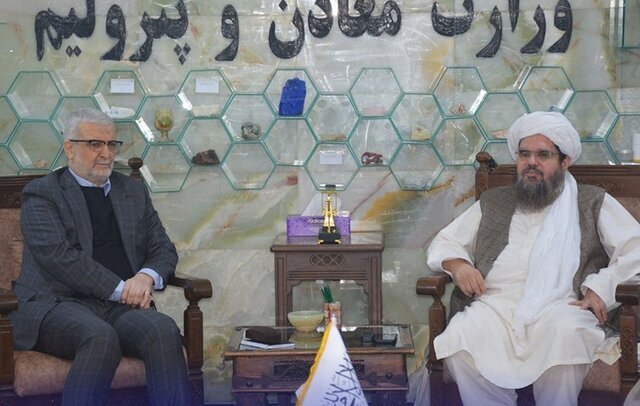Iran, Afghanistan pledge cooperation in mining sector: envoy

TEHRAN - Hassan Kazemi Qomi, Iran’s Special Envoy for Afghanistan, has affirmed Tehran’s willingness to collaborate with Kabul, particularly in the realm of mining.
In a recent meeting between Shahabuddin Delawar, the acting minister of mines and petroleum of the caretaker Taliban government, and Iran’s Kazemi Qomi, both sides deliberated on the significance of bilateral relations and Afghanistan's strides in the mining industry.
In an exclusive interview with the Teran Times in late February, Kazemi Qomi stated, “The Taliban was invited to hold meetings with UN officials in Doha after the main summit. They weren’t asked to take part in the summit itself,” Hassan Kazemi Qomi said before explaining that Afghanistan’s de facto rulers had also been scheduled to sit down with human rights activists and listen to their concerns. “The Taliban did not want to meet with activists. They also wanted to be present at the summit which could not be made possible. That’s why they refrained from sending a delegation to Qatar.”
On February 18-19, United Nations Secretary-General Antonio Guterres convened a meeting on Afghanistan in Doha to discuss the humanitarian situation in the war-torn country.
Guterres said the Taliban had set unacceptable conditions for attending the meeting. “I received a letter [from the Taliban] with a set of conditions to be present in this meeting that were not acceptable,” he noted.
On February 18, in a post on X and after meeting in the Qatari city of Doha with his counterparts from Pakistan, China, and Russia, respectively, Zamir Kabulov, Yue Xiaoyong, and Asif Ali Khan Durrani, Kazemi Qomi added that the regional contact committee has mostly been successful in influencing issues that affect the security and stability of Afghanistan.
On February 18, Special Envoys on Afghanistan appointed by the UN began a two-day conference in Doha to deliberate on Resolution 2679, which deals with a “commitment to the sovereignty, independence, territorial integrity and national unity of Afghanistan.”
The Doha session on Afghanistan was being hosted by UN Secretary-General Antonio Guterres. It was the second UN-organized meeting on the topic in less than a year. Leaders of the Taliban declined to attend the conference because they were not invited to the May 2023 session.
Defending the Afghan people is important to Tehran’s diplomacy, Kazemi Qomi stated in a Sunday meeting with Suhail Shaheen, the director of the Taliban political office in Doha.
He stated that cooperation between the peoples of the two adjacent nations has taken place in a number of areas, including religion and culture.
In a separate post on X on Saturday, he also stressed that he had “explicit but very constructive” discussions with Tomas Niklasson, the Special Representative of the European Union for Afghanistan (EUSE).
“If Europe wants to help the Afghan people, it should not take humanitarian aid as hostage for its regional relations,” Kazemi Qomi told the European diplomat.
During the meeting, he highlighted that Europe should not tether sending humanitarian aid to Afghanistan to its regional affiliations.
He also disclosed the details regarding the meeting on his online platform. He wrote, “Pivotal emphasis was placed on the necessity for Europe to refrain from tying humanitarian aid to its relationship with the regional alliances if it genuinely aims to support the people of Afghanistan.”
The Taliban stormed back to power in August 2021 after making sweeping advances across the country, which triggered a messy withdrawal by the United States-led foreign forces as well as the rapid collapse of the country's security forces.
The U.S. invaded Afghanistan in October 2001 following the September 11, 2001 attacks on the United States, despite the fact that no Afghan national was involved in the attacks. Hundreds of thousands of Afghans died in the U.S. war of aggression on the country.
Leave a Comment